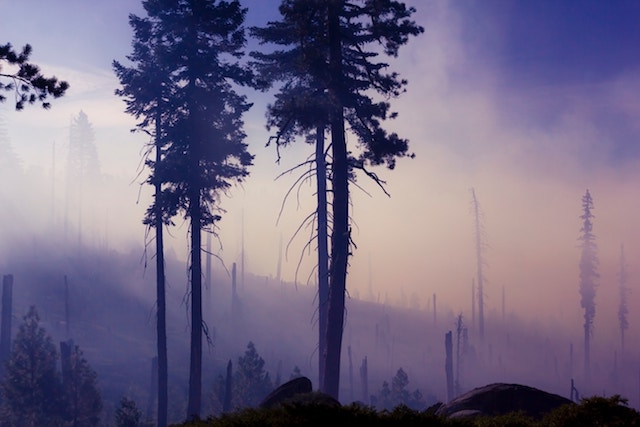The world needs us to think. The world needs us to go deeper. The world needs us to question everything. The world needs us to admit when we are wrong.
This isn’t the article I intended to write.
Recently, I was on a road trip through Oregon. If you are not aware, Oregon is burning right now, along with many other places.
It’s summertime, it’s dry, and that means it’s wildfire season.
I don’t have much experience with wildfires, so understandably I was a little concerned on this trip. Most days, it felt like we were constantly standing downwind of a campfire, with the effect heightened by the fact that temperatures were higher than normal. Local friends confirmed the fires seemed excessive.
I was a conservation biologist for 12 years. I worked on coral reef conservation and I know that coral bleaching—when coral lose the algae that live inside of them that gives them both their color and food, resulting least of all in stress, but usually death—is tied to global warming. In fact, I have published research on the topic.
I thought, surely, this “rise” in wildfires must be due to global warming as well.
I planned to tie together the burning of the forests with the “burning” of coral reefs in the ever-warming oceans and discuss how both are tied to global warming, then suggest what we can do about it as individuals.
I thought it would be a great article.
With wildfires, however, I only had this limited experience, so I set out to further my knowledge with some research.
I wanted to see what some experts had to say about it and make sure that there was some data to back up what I thought was a logical conclusion—that our warming planet must be responsible for the literal burning I was witnessing in Oregon.
I set out to write the article, sure that it would be simple and easy to make my point. Global warming is bad, the world is burning, both on land and at sea.
However, it turns out I may be wrong about the forest fires.
“I may be wrong” might be one of the toughest things to say (or type) for any of us.
I desperately wanted to write the article I had planned. However, as my research deepened, I discovered that the topic is more complicated than I aticipated.
The more I researched, the less comfortable I felt trying to make such a strong link between wildfires and global warming. There may be a link, but the story is not clear-cut—pun not intended.
With the rise in fake news, and even before its rise, reporting truth in an ethical way is one of the ways we can all be of most benefit.
There are many serious issues facing our country and our planet today, and those of us who feel called to speak up about them, be of benefit, and make a difference need to do so.
But each time any of us speaks up with supposed facts that are later proven to be false, it weakens our argument, strengthens the other side, hurts peaceful discourse, and moves us further away from coming an understanding on a topic.
It is important for all of us—especially those of us with good intentions—to make sure we are reporting the truth.
Fake news has been freaking me out for a while—there are some people who are actually creating it intentionally, and the thought that, at some point, we may not be able to believe anything on the news is terrifying to me.
At this point, it goes beyond just making sure we are telling the truth to keep our arguments strong. We need to actively combat fake news.
From my time and experience with Elephant Academy, I want to share some ways in which we all can combat fake news.
1. Slow down or be more mindful, both in life and especially in our news consumption. Practice “slow journalism.”
“Life moves pretty fast. If you don’t stop and look around once in a while, you could miss it.” ~ Ferris Beuller’s Day Off
Life doesn’t just move “pretty fast” these days. If we are not speeding, sometimes it seems as if we are moving backward. Everything is “go-go-go” in our modern, Western lives—even our consumption of the news.
We read headlines and pass judgment without reading the articles. We get information in 140 characters, seven-second clips, hashtags, or single pictures. We hardly stop to process before we move onto the next blurb of information.
We need to slow down and think about what we are reading, check sources, and check dates.
2. Always look for the two sides—at least—of an argument or issue.
“Until the lion learns how to write, every story will glorify the hunter.” ~ African Proverb
We’ve all heard many such quotes that explain that there are two sides to every story, but many stories have more than two sides. Often there are multiple sides, and the truth may lie not in one specifically, but in bits and pieces from different sides at the same time.
When I set out to work on the original article, I could have pulled some headlines and facts from past years or from specific places around the world and made the article work. There were definitely ways in which forest fires have been tied to global warming, but that wasn’t the whole story.
If you look at the number of fires and acres burned, you can see they have fluctuated over the past few decades.
In 2008, for example, the National Wildlife Federation put out a video discussing how global warming would contribute to longer fire seasons with earlier snow melt, drier conditions, diseases brought by more insects, and increased lightning strikes from more severe storms, all of which would increase forest fires.
In contrast, a recent article in The New York Times interviewed researchers who argue that the fires are necessary, and that we are harming ecosystems by suppressing them. They looked back on wildfires historically and discussed how fire suppression efforts began in the early 19th century, and that before that over 15 million acres—maybe as much as double that—would burn a year compared to the four or five million now.
Many factors, including global warming and fire suppression efforts, lead to a much more complicated story than it seems on the surface. This is just one small example, but almost every story is nuanced, complicated, and rarely simple.
When it seems too easy to be true, and even when it doesn’t, look harder.
3. Be conscious of the “news” we share with others.
“Knowledge is knowing what to say. Wisdom is knowing whether or not to say it.” ~ Starhawk
Inevitably, news topics come up as we talk with friends. Maybe we heard something somewhere or read one of those quick headlines or want to share something someone else told us but we don’t actually know where they got that information.
Just as we should slow down in our consumption of the news, we can also slow down in what we share with others. Can we be certain what we are sharing is the truth before we share it?
As I started to think about my original article idea, I immediately started talking to friends about it. It was hard not to, as we stepped into smoke every time we went outside.
Honestly, I had said to some of my friends that I thought the wildfires might be tied to global warming. It seemed to make sense and we all agreed. Now, as I explain that the issue itself is more complicated, the conversations are more complicated as well.
4. Don’t be afraid to question the news (or your friends, or yourself).
“Be skeptical, but learn to listen. Don’t believe yourself or anybody else. Use the power of doubt to question everything you hear: is it really the truth? Listen to the intent behind the words, and you will understand the real message.” ~ Don Miguel Ruiz, Jr.
As we are faced with more and more news of unreliable origin, this becomes increasingly important. Stop and think about the things we read or hear, and especially about the perspective and motivation of the source.
While I do not believe that any of the sources I saw during my research on wildfires were consciously trying to skew their arguments or create fake news, they all had different perspectives, motivations, and conclusions, some supporting the link between global warming and wildfires and some not.
Even if the source doesn’t intend to be false or harmful, we all have our own perspectives and agendas that filter our view and how we convey our reality. We should always take that into account.
Really, all of these reminders for us are different iterations of the same thing—slow down, think, be mindful.
Whenever we read or hear anything, whether it is on the news or from another person or even a thought in our own minds, we should question it.
5. Don’t be afraid to admit when we are wrong.
“To err is human; to admit it, super-human.” ~ Doug Larson
For most of us humans, it is difficult to admit when we are wrong. Add passion for a topic and the ease of confirmation bias—the tendency to search for, interpret, favor, and recall information in a way that confirms one’s preexisting beliefs or hypotheses—and it is even more difficult to admit when we are wrong.
I struggled with this most of my life, and only recently feel like I have made some improvement in this regard. Being stubborn and not wanting to admit I was wrong even landed me in a very short marriage that I knew was doomed before the wedding.
In journalism, admitting when we are wrong is important, but often not much attention is paid to retractions and post-publication apologies. Still, admitting when we are wrong is necessary, both in journalism and in our everyday lives.
Let us all go forth and think, go deeper, question, and not be afraid to admit when we are wrong.
Fake news is joining global warming as one of the biggest problems facing our planet today.
In fact, fake news is making global warming more difficult to fight.
Let’s combat both together.
Author: Gin Carter
Image: Bjørn Tore Økland/Unsplash; Thomas Charters/Unsplash
Editor: Emily Bartran
Copy Editor: Leah Sugerman
Social Editor: Danielle Beutell









Read 29 comments and reply